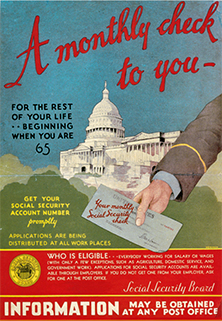
Eric Foner, excerpt, "The Second New Deal," Give Me Liberty: An American History (Inkling)
THE AMERICAN WELFARE STATE
The centerpiece of the Second New Deal was the Social Security Act of 1935. It embodied Roosevelt’s conviction that the national government had a responsibility to ensure the material well-being of ordinary Americans. It created a system of unemployment insurance, old age pensions, and aid to the disabled, the elderly poor, and families with dependent children.
None of these were original ideas. The Progressive platform of 1912 had called for old age pensions. Assistance to poor families with dependent children descended from the mothers’ pensions promoted by maternalist reformers. Many European countries had already adopted national unemployment insurance plans. What was new, however, was that in the name of economic security, the American government would now supervise not simply temporary relief but a permanent system of social insurance.

The Social Security Act launched the American version of the welfare state—a term that originated in Britain during World War II to refer to a system of income assistance, health coverage, and social services for all citizens. The act illustrated both the extent and the limits of the changes ushered in by the Second New Deal. The American welfare state marked a radical departure from previous government policies, but compared with similar programs in Europe, it has always been far more decentralized, involved lower levels of public spending, and covered fewer citizens. The original Social Security bill, for example, envisioned a national system of health insurance. But Congress dropped this after ferocious opposition from the American Medical Association, which feared government regulation of doctors’ activities and incomes.
THE SOCIAL SECURITY SYSTEM
Some New Dealers desired a program funded by the federal government’s general tax revenues, and with a single set of eligibility standards administered by national officials. But Secretary of Labor Frances Perkins, along with powerful members of Congress, wished to keep relief in the hands of state and local authorities and believed that workers should contribute directly to the cost of their own benefits. Roosevelt himself preferred to fund Social Security by taxes on employers and workers, rather than out of general government revenues. He believed that paying such taxes gave contributors “a legal, moral, and political right” to collect their old age pensions and unemployment benefits, which no future Congress could rescind.
As a result, Social Security emerged as a hybrid of national and local funding, control, and eligibility standards. Old age pensions were administered nationally but paid for by taxes on employers and employees. Such taxes also paid for payments to the unemployed, but this program was highly decentralized, with the states retaining considerable control over the level of benefits. The states paid most of the cost of direct poor relief, under the program called Aid to Dependent Children, and eligibility and the level of payments varied enormously from place to place. As will be discussed later, the combination of local administration and the fact that domestic and agricultural workers were not covered by unemployment and old age benefits meant that Social Security at first excluded large numbers of Americans, especially unmarried women and non-whites.
Nonetheless, Social Security represented a dramatic departure from the traditional functions of government. The Second New Deal transformed the relationship between the federal government and American citizens. Before the 1930s, national political debate often revolved around the question of whether the federal government should intervene in the economy. After the New Deal, debate rested on how it should intervene. In addition, the government assumed a responsibility, which it has never wholly relinquished, for guaranteeing Americans a living wage and protecting them against economic and personal misfortune. “Laissez-faire is dead,” wrote Walter Lippmann, “and the modern state has become responsible for the modern economy [and] the task of insuring... the standard of life for its people.”
Eric Foner, excerpt, "The Second New Deal," Give Me Liberty: An American History (Inkling)